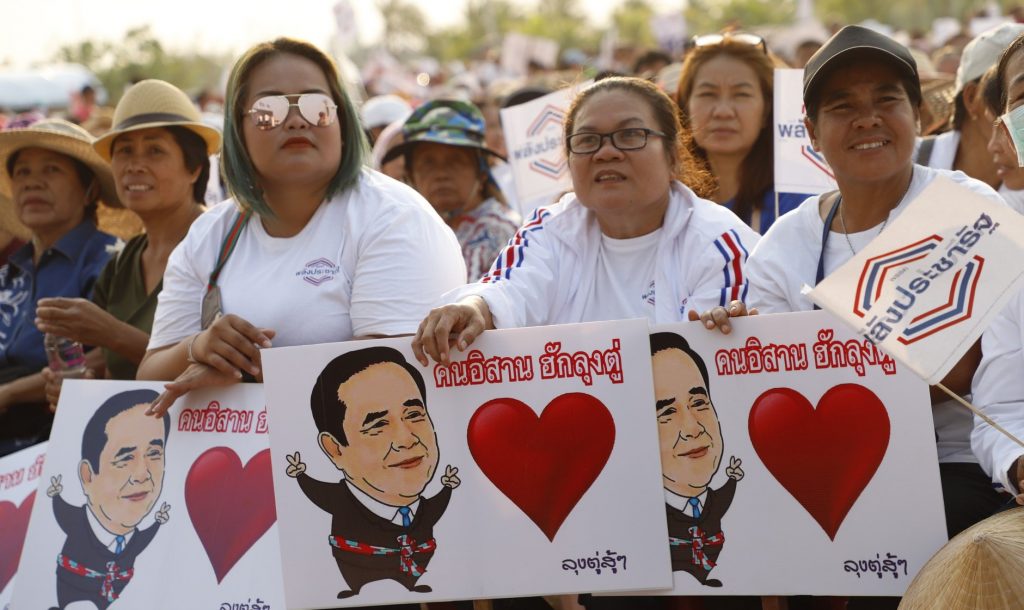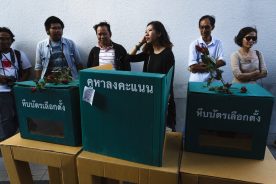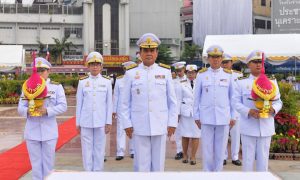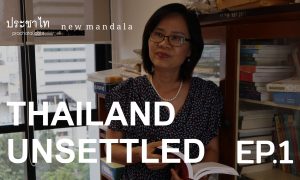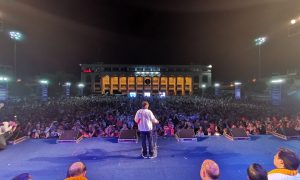“In this election, the constitution was designed for us,”
Somsak Thepsuthin, Palang Pracharat leader, 18 November 2018
Palang Pracharat Party will be just a little over a year old when Thailand goes to vote for the first time in almost a decade on 24 March 2019. The new party was only registered with the Election Commission on 2 March 2018 by Chuan Chuchan and Colonel Suchart Jantarachotikul, former members of the National Reform Steering Assembly appointed by the National Council for Peace and Order (NCPO). It is common knowledge that neither of these two men truly lead Palang Pracharat. Since its creation, Palang Pracharat has made it clear that its missions are to ensure that General Prayut Chan-o-cha continues on as prime minister following elections, and to support the policy direction of the current military government. Even the party’s name is an unabashed derivative of a policy inaugurated by the NCPO.
The connections between Palang Pracharat and Prayut’s regime became further apparent in September 2018 when 4 ministers in the cabinet took up executive positions in the party, with Industry Minister Uttama Savanayana assuming the role of party leader. All four ministers are finance and economics technocrats with close ties to NCPO member and Deputy Prime Minister Somkid Jatusripitak. Soon business elites, local political heavyweights, retired senior politicians from a variety of parties, former bureaucrats, university executives, and even actors and singers lined up to throw their support behind the party.
For a moment, it seemed as if all roads were leading to Palang Pracharat. An intense period of fundraising mobilised 600 million baht in donations to the party, stirring public suspicions that the source of those donations were state departments and business groups who have benefitted from Prayut’s administration. Whatever the case, Palang Pracharat’s backing from business and state elites led party leaders such as Suriya Juangroongruangkit, a former member of Thaksin Shinawatra’s defunct Thai Rak Thai Party, to confidently predict a landslide electoral victory.
On the morning of 8 February 2019, amidst the confusion and chaos of the “political earthquake” caused by the Thai Raksa Chart party’s nomination of former princess Ubolratana as its prime ministerial candidate, General Prayut accepted his own nomination by Palang Pracharat. The moment amounted to nothing less than a shift in politics, signaling a lapse in unity among Thailand’s highest political elites.
If the army served as the political tool used by military leaders to seize power on 22 May 2014, then the junta established Palang Pracharat as the political machine to maintain and prolong the power that was taken from the Yingluck Shinawatra government through that coup. The success of Prayut’s attempt to evolve the regime through which he exercises power from absolute military authoritarianism to semi-authoritarianism depends on two important tools: (1) Palang Pracharat Party, and (2) a new electoral system designed to assist it in winning the 2019 elections, whose biases contributed to Somsak Thepsuthin’s boastful remark that the 2017 constitution was designed for Palang Pracharat (Somsak, once a leader Thai Rak Thai, has now taken up the role of campaign strategist in Palang Pracharat).
Yet when Thai political history is viewed comparatively with other countries, coupled with scrutiny of Thailand’s current political landscape, it suggests that Palang Pracharat’s mission of prolonging Prayut’s rule and installing a semi-authoritarian regime will not be as easy as expected by the conservative elites behind the party.
Political parties: the weakness that haunts Thailand’s conservative elites
In contrast to the case in some other Asian countries, conservative elites in Thailand have never experienced success in establishing a political party capable of dominating electoral competition. Indonesia during the Suharto era saw Golkar, while the United Malays National Organisation governed Malaysia for 6 decades (only recently losing elections in 2018). In Singapore, the People’s Action Party has governed from independence until today. In Taiwan, the Kuomintang has controlled government for much of recent history, with its dominance only falling vulnerable to competition from the opposition around the year 2000. That dominance is echoed in Japan, where the Liberal Democratic Party (LDP) continuously enjoyed a majority of votes from 1955, until that stability was challenged for brief periods beginning in the 1990s and 2010s. The LDP in the present day has returned to controlling a majority of seats in the legislature once again.
But if we return to the Thai case, conservative elites have never succeeded in establishing a party capable of dominating the political system, even while they have effectively engaged in coups to seize power throughout history. I call this marriage of success and failure “Thai-style authoritarianism”, whose defining feature is “the effective seizure of power through coups, but the clumsy failure to maintain it through elections”. It is this feature which destablises Thai politics, leading it to swing to and fro between authoritarian and democratic regimes. Whenever royalist–conservative elites have seized power by deposing a civilian government, when it has reached the time to return to elections they have failed to make that power durable by establishing political parties able to win over a majority of the public.
The consequence of this persistent incapability has been the repeated, continuous resort to the performance of coups, to the point that coups have become the sole mechanism for coming into and maintaining power. The persistent failure of royalist–conservative elites at the ballot box throughout history is a key explanation for their disrespect of democratic processes and institutions, and for the fragility of democracy in Thailand. (I have elaborated this argument further in a past New Mandala article).
From a historical perspective then, Palang Pracharat is nothing new—it is the revival of old political tactics. Witness the military-backed Seri Manangkhasila party (elections in 1957), the Saha Pracha Thai party (elections in 1969) and the Samakheetham party (elections in 1992), all of which failed to prolong the power of the incumbent junta. And when these parties failed in their function of lengthening their leaders’ hold on power, they fell apart and were not seen again—they were parties with a lifespan of only one election, or “one-time only parties”. After May 1992, the name “Samakheetham” was not heard again.
It is noteworthy that the NCPO regime has been in power for 5 years—longer than any other military government that emerged after the 14 October 1973 uprising—yet it has not used the great reserves of time and resources at its disposal to build up the foundations of a high-functioning political party. Palang Pracharat was hastily created only a year before the final election date, without a clear campaign strategy or policy platform. Instead, an “ad hoc party” has been made possible by the co-optation of faction leaders and candidates from other political parties, with the hopes that the exploitation of state mechanisms to interfere in the electoral process will take care of the rest. Palang Pracharat looks set to follow the fate of proxy parties established by coup-makers that have come before: a short life span once it fails to propel the junta leader to a decisive victory.
Old politics in a new landscape
In comparison to the Samakheetham party that emerged after the coup of 1991, Palang Pracharat is entering the electoral arena under far less favorable political conditions. In 1992, the party system and electoral culture remained weak with little public emphasis on issues of policy and ideology. Political parties lacked clear voter strongholds and were composed of several political factions with no shared visions.
But this all changed with the political reforms of 1997, which decisively transformed the political landscape. Thai politics transitioned to a system dominated by two enduring large parties which represent policy platforms and clear voter bases: Pheu Thai, which commands popularity in the north and northeast, and the Democrat Party, which enjoys strong backing in the south. In all 4 rounds of elections from 2001–2011, these two parties collectively controlled more than 80% of seats. Between their dominance, it will be difficult for other parties to carve out space of their own.
While it is true that Palang Pracharat is operating in an electoral arena whose rules have been designed to its advantage, it faces competitors who will not be overtaken easily. So much so that one of its leaders, Somsak Thepsuthin, has now conceded, “What must be done to change the sentiments that the people have towards the old political parties? If we cannot change the tide of sentiment behind the old parties, our chances of winning are slim”.
But while Palang Pracharat may be aware that the political environment has evolved, the party has stuck with the same old strategies and tactics for drawing votes, ever hopeful that these methods will bring them victory in the upcoming elections. Those include the co-optation of former MPs from other political parties (Palang Pracharat has succeeded in pulling 51 candidates from Pheu Thai, the Democrat Party, Bhumjaithai, the Phalang Chon Party and the Chartthaipattana Party); the co-optation of a network of vote canvassers that relies on people of influence at the local level; the seeking of support from local chao pho (bosses) and the exploitation of systems of patronage; and the distribution of goods and money.
Why Thailand’s generals fail to co-opt elections
History and electoral reality suggest that the 2019 elections will deliver another “wasted coup”.
A hybrid party
When it comes to Palang Pracharat’s party brand, the party is complex to no small degree. If parties are akin to goods in the political marketplace, Palang Pracharat is a hybrid product characterised by a high degree of internal conflict. The party pushes a line opposed to Thaksin and populist economic policies, yet in the final days of campaigning announced an array of policies that are more populist than anything that has come from Pheu Thai. It has made a last-ditch effort to transform Prayut’s image into that of a modern-day businessman who is both lovable and friendly, even though a large number of the General’s supporters admire him as a strong-armed military leader who has apparently brought peace to the country. Similarly, Palang Pracharat is constituted by groups devoted to wildly diverse ideologies and political leanings, from technocrats, local politicians and businessmen, political bosses, Sino-Thai business groups, former People’s Democratic Reform Committee (PDRC) leaders, ultra royalists, former red shirt leaders, to politicians once allied with the Thaksin camp.
The hybrid nature of Palang Pracharat means that it is constituted by several political factions which risk falling into conflict during negotiations over coveted cabinet positions in the aftermath of the elections. Or, if the party fails to form government completely, there is a possibility that Palang Pracharat may fall apart altogether and dissolve itself as has been the case with so many other proxy parties of the past.
The success or failure of Palang Pracharat is a measure of change in Thai politics. If the party receives a large number of seats (the party’s leaders are aiming for 150), the result will reflect that local networks of influence, systems of patronage and state interference continue to play an important role in Thai elections. But if Palang Pracharat loses the election severely and gets very few seats (coming third, or below), then the 2019 elections will be evidence that both urban and rural voters exercise their rights to vote independently of local networks of influence and see through state attempts to interfere in electoral process.
A loss of Palang Pracharat would be further proof of the ineffectiveness of the old politics, as well as the enduring failure of Thailand’s royalist, conservative elites to hold onto power through electoral institutions and adapt to democratic forms of political competition.
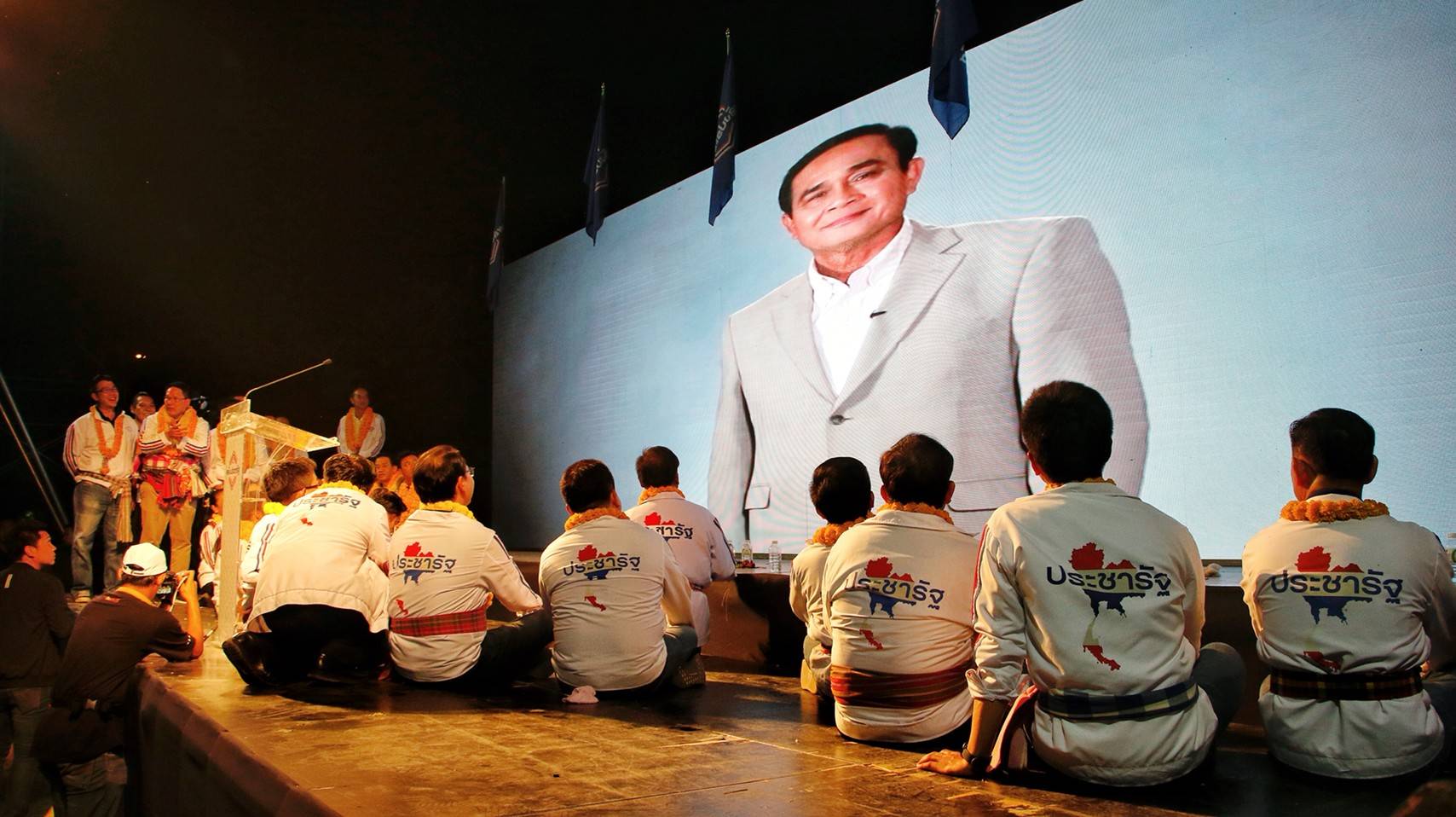
Image credit: พรรคพลังประชารัฐ Public Facebook Page
“การเลือกตั้งนี้รัฐธรรมนูญดีไซน์มาเพื่อพวกเรา”
สมศักดิ์ เทพสุทิน แกนนำพรรคพลังประชารัฐ, 18 พฤศจิกายน 2561
พรรคพลังประชารัฐ (พปชร.) เป็นพรรคการเมืองเกิดใหม่ที่จะมีอายุครบ 1 ปีในการเลือกตั้งวันที่ 24 มีนาคม เพิ่งยื่นจดทะเบียนกับคณะกรรมการการเลือกตั้ง (กกต.) เมื่อวันที่ 2 มีนาคม 2561คนยื่นจดทะเบียนคือ นายชวน ชูจันทร์ และพันเอกสุชาติ จันทรโชติกุล อดีตสมาชิกสภาขับเคลื่อนการปฏิรูปประเทศที่ตั้งโดยคณะรักษาความสงบแห่งชาติ (คสช.) แต่ทุกคนก็รู้ว่าทั้งสองคนไม่ใช่ผู้นำพรรคตัวจริง พรรคพลังประชารัฐประกาศเจตนารมณ์ชัดเจนตั้งแต่ก่อตั้งว่า ภารกิจคือผลักดันให้พลเอกประยุทธ์ จันทร์โอชา กลับมาเป็นนายกรัฐมนตรี และสนับสนุนแนวทางนโยบายของรัฐบาลคสช. ชื่อพรรคก็นำมาจากชื่อนโยบายหลักของรัฐบาลโดยไม่อ้อมค้อม
ความเชื่อมโยงระหว่างพรรคพลังประชารัฐกับระบอบคสช.ของประยุทธ์ ชัดเจนขึ้นเมื่อ 4 รัฐมนตรีจากรัฐบาลประยุทธ์รับบทบาทเป็นแกนนำขับเคลื่อนพรรคตั้งแต่เดือนกันยายน 2561 โดยมีนายอุตตม สาวนายน รัฐมนตรีว่าการกระทรวงอุตสาหกรรม รับตำแหน่งหัวหน้าพรรค ทั้ง 4 รัฐมนตรีเป็นเทคโนแครตสายการเงินและเศรษศาสตร์ที่สนิทสนมใกล้ชิดกับนายสมคิด จาตุศรีพิทักษ์ หลังจากนั้นพรรคพลังประชารัฐจัดงานเปิดตัวอย่างยิ่งใหญ่และจัดประชุมใหญ่ในโรงแรมหรูหราใจกลางเมือง บรรดาชนชั้นนำทางงธุรกิจ กลุ่มการเมืองท้องถิ่น อดีตนักการเมืองใหญ่จากพรรคต่างๆ อดีตข้าราชการ ผู้บริการมหาวิทยาลัย ดารา นักร้อง ก็พากันเดินสายเข้าสู่พรรคเกิดใหม่นี้ ณ ขณะนั้น ดูเหมือนถนนทุกสายมุ่งข้าสู่พรรคพลังประชารัฐ มีการจัดระดมทุนอย่างยิ่งใหญ่ซึ่งระดมเงินบริจาคได้ถึง 600 ล้านบาท อันนำมาสู่ข้อกังขามากมายจากสังคม ถึงแหล่งที่มาของเงินบริจาคจากหน่วยงานรัฐและกลุ่มธุรกิจที่ได้รับประโยชน์จากรัฐบาลพลเอกประยุทธ์ อย่างไรก็ตาม พลังสนับสนุนจากกลุ่มทุนและอำนาจรัฐ ทำให้แกนนำพรรคอย่างนายสุริยะ จึงรุ่งเรืองกิจ ประกาศอย่างมั่นใจว่าพลังประชารัฐจะชนะเลือกตั้งอย่างถล่มทลายและได้จัดตั้งรัฐบาลอย่างแน่นอน
ในเช้าวันที่ 8 กุมภาพันธ์ 2562 ท่ามกลางความสับสนอลหม่านจากเหตุ “แผ่นดินไหวทางการเมือง” หลังจากพรรคไทยรักษาชาติเสนอชื่อทูลกระหม่อมหญิงอุบลรัตน์ฯ เป็นแคนดิเดตนายก พลเอกประยุทธ์ ก็ตอบรับข้อเสนอของพรรคพลังประชารัฐที่เสนอชื่อเขาเป็นแคนดิเดตนายกรัฐมนตรี ซึ่งนับเป็นจังหวะก้าวทางการเมืองเชิงสัญลักษณ์ที่สะท้อนความไม่เป็นเอกภาพในหมู่ชนชั้นนำระดับสูงของไทย
หากกองทัพคือเครื่องมือทางการเมืองที่ผู้นำกองทัพใช้เพื่อการยึดอำนาจในที่ 22 พฤษภาคม 2557 พรรคพลังประชารัฐก็คือจักรกลทางการเมือง (political machine) ที่ตั้งขึ้นมาเพื่อรักษาและสืบทอดอำนาจที่ฝ่ายกองทัพยึดมาได้จากรัฐบาลของยิ่งลักษณ์ ชินวัตร ความพยายามของประยุทธ์ที่จะแปรเปลี่ยนการใช้อำนาจของเขาจากระบอบเผด็จการทหารแบบเบ็ดเสร็จไปเป็นระบอบเผด็จการครึ่งใบที่มีการเลือกตั้ง (semi-military authoritarianism) จำเป็นต้องอาศัยเครื่องมือสำคัญ 2 ประการ คือ หนึ่ง พรรคการเมืองของตนเอง และ สอง ระบบเลือกตั้งที่ถูกออกแบบใหม่เพื่อเอื้อให้พรรคที่คสช. สนับสนุนสามารถชนะเลือกตั้งได้ จนนำมาสู่ประโยคอันลือลั่นของนายสมศักดิ์ เทพสุทิน อดีตแกนนำพรรคไทยรักไทยที่ผันตัวมาเป็นผู้วางแผนยุทธศาสตร์การหาเสียงให้กับพรรคพลังประชารัฐว่ารัฐธรรมนูญฉบับ 2560 ดีไซน์มาเพื่อพลังประชารัฐ
อย่างไรก็ตาม หากพิจารณาจากประวัติศาสตร์ของไทย เปรียบเทียบกับประเทศอื่นๆ รวมถึงภูมิทัศน์การเมืองไทยในปัจจุบัน ภารกิจของพรรคพลังประชารัฐในการสืบทอดอำนาจให้กับพลเอกประยุทธ์และสถาปนาระบอบเผด็จการครึ่งใบกลับไม่ใช่ภารกิจที่ง่ายดายดังที่ชนชั้นนำที่อยู่เบื้องหลังพรรคนี้คาดคิด
ปัญหาหลอกหลอนชนชั้นนำอนุรักษ์นิยมไทย: ความอ่อนแอในการสร้างพรรคการเมือง
หากเทียบกับประเทศอื่นๆ ในภูมิภาคเอเชียด้วยกัน ชนชั้นนำของไทยไม่เคยประสบความสำเร็จในการตั้งพรรคการเมืองของตนเองที่เข้มแข็งจนมีอำนาจครอบงำรัฐ (dominant party) ในประเทศอินโดนีเซียสมัยยุคซูฮาร์โตมีพรรคโกลคาร์ ส่วนมาเลเซียก็มีพรรคอัมโนที่ปกครองประเทศมาถึง 6 ทศวรรษ (เพิ่งจะแพ้การเลือกตั้งเมื่อปี 2018) ในสิงคโปร์ก็มีพรรค People’s Action Party (PAP) ที่ปกครองประเทศตั้งแต่ได้รับเอกราชมาถึงปัจจุบัน ในไต้หวันก็มีพรรคก๊กมินตั๋ง ที่โดดเด่นและครองอำนาจมายาวนานจนเพิ่งมาถูกท้าทายและสถานะครอบงำเริ่มสั่นคลอนจากการแข่งขันที่เข้มแข็งของฝ่ายค้านตั้งแต่ปี 2000 ซึ่งคล้ายกับกรณีญี่ปุ่นที่มีพรรคหลักครอบงำ คือ พรรค Liberal Democratic Party (LDP) ซึ่งครองเสียงข้างมากมาอย่างต่อเนื่องตั้งแต่ พ.ศ. 2498 และเพิ่งมาถูกท้าทายในช่วงสั้นๆ ในทศวรรษ 1990 และ 2010 แต่ปัจจุบันก็สามารถผลาดกลับมาครองเสียงข้างมากในสภาได้อีกครั้ง
หันกลับมามองที่ไทย ชนชั้นนำอนุรักษ์นิยมกลับไม่ประสบความสำเร็จในการสร้างพรรคที่เข้มแข็งมาครอบงำระบบการเมือง แม้ว่าจะประสบความสำเร็จในการทำรัฐประหารยึดอำนาจมาตลอดประวัติศาสตร์ จนก่อเกิดเป็นรูปแบบการเมืองที่ผู้เขียนเรียกว่า “เผด็จการแบบไทยๆ” ที่มีลักษณะสำคัญคือ “ยึดอำนาจสำเร็จผ่านการรัฐประหาร แต่ล้มเหลวในการรักษาอำนาจผ่านการเลือกตั้ง” ทำให้การเมืองของไทยไร้เสถียรภาพและสวิงไปมาระหว่างระบอบเผด็จการประชาธิปไตย กล่าวคือ เมื่อชนชั้นนำรอยัลลิสต์-อนุรักษ์นิยมยึดอำนาจมาได้ด้วยการรัฐประหารล้มรัฐบาลพลเรือน แต่พอถึงเวลาที่ต้องกลับสู่การเลือกตั้ง พวกเขาประสบความล้มเหลวในการสร้างพรรคการเมืองที่เข้มแข็งที่สามารถชนะใจประชาชนเสียงข้างมากเพื่อครองอำนาจอย่างต่อเนื่อง ทำให้ต้องยึดอำนาจด้วยการทำรัฐประหารซ้ำๆ เรื่อยมา จนพึ่งพิงการรัฐประหารเป็นกลไกหลักในการขึ้นสู่อำนาจและรักษาอำนาจ การที่ชนชั้นนำรอยัลลิสต์-อนุรักษ์นิยมไม่ประสบความสำเร็จการเลือกตั้งมาตลอดประวัติศาสตร์ จึงเป็นเหตุผลสำคัญให้พวกเขาไม่เคารพกติกาและสถาบันประชาธิปไตย และนี่คือสาเหตุมูลฐานของความไร้เสถียรภาพของประชาธิปไตย ผู้เขียนได้อธิบายประเด็นนี้ไว้อย่างละเอียดแล้วในบทความอีกชิ้นหนึ่ง จึงจะไม่กล่าวซ้ำในทีนี้
มองจากมุมมองทางประวัติศาสตร์ พรรคพลังประชารัฐจึงไม่ใช่ปรากฏการณ์ใหม่ แต่เป็นการรื้อฟื้นการเมืองแบบเก่ามาใช้ ก่อนหน้านี้เราก็เคยมีพรรคเสรีมนังคศิลา (การเลือกตั้ง 2500) พรรคสหประชาไท (การเลือกตั้ง 2512) และพรรคสามัคคีธรรม (การเลือกตั้ง 2535) ที่ไม่ประสบความสำเร็จในการสืบทอดอำนาจให้คณะรัฐประหาร และเมื่อล้มเหวในการสนับสนุนให้ผู้นำของตนได้ครองอำนาจต่อ พรรคการเมืองเหล่านี้ก็ล้มหายตายจากไป กลายเป็นพรรคที่มีอายุแค่การเลือกตั้งเดียว (one-time only party) ดังที่หลังเหตุการณ์พฤษภาคม 2535 ก็ไม่มีใครได้ยินชื่อพรรคสามัคคีธรรมอีกเลย
น่าสนใจว่า ระบอบคสช. ซึ่งอยู่ในอำนาจถึง 5 ปี ซึ่งยาวนานกว่ารัฐบาลทหารทุกชุดตั้งแต่หลังเหตุการณ์ 14 ตุลาคม 2516 แต่ก็ไม่ได้ใช้เวลาและทรัพยากรที่ตนเองมีอย่างมากมายมหาศาลในการสร้างพรรคการเมืองที่เข้มแข็งขึ้นมา พรรคพลังประชารัฐถูกตั้งขึ้นมาอย่างกะทันหัน แค่ 1 ปีก่อนการเลือกตั้ง โดยไม่มียุทธศาสตร์และนโยบายที่ชัดเจน เน้นการสร้างพรรคด้วยการดึงหัวหน้ามุ้งการเมืองและผู้สมัครมาจากพรรคอื่นๆ มาสร้างพรรคเฉพาะกิจ (ad hoc party) โดยหวังกลไกรัฐช่วยสนับสนุน ซึ่งมีแนวโน้มที่จะซ้ำรอยประวัติศาสตร์ของพรรคนอมินีของคณะรัฐประหารก่อนหน้านี้ คือ เป็นพรรคที่มีอายุสั้นเมื่อล้มเหลวในการผลักดันหัวหน้าคณะรัฐประหารขึ้นสู่อำนาจ
พรรคผสมพันทาง (hybrid party): การเมืองเก่าในภูมิทัศน์การเมืองใหม่
หากเทียบกับพรรคสามัคคีธรรมของคณะรัฐประหาร 2534 พรรคพลังประชารัฐเข้าสู่สนามการเลือกตั้งด้วยเงื่อนไขทางการเมืองที่ยากกว่าเดิม ในสมัยปี 2535 ระบบพรรคการเมืองอ่อนแอ ขาดนโยบาย ขาดอุดมการณ์ ขาดผู้นำที่เข้มแข็ง และไม่มีฐานเสียงที่ชัดเจนของตนเอง เป็นแค่ที่รวมของมุ้งการเมือง (political faction) ทั้งหมดนี้เปลี่ยนไปหลังการปฏิรูปการเมืองในปี 2540 ภูมิทัศน์การเมืองไทยเปลี่ยนไปโดยสิ้นเชิง การเมืองไทยเกิดระบบสองพรรคการเมืองใหญ่ที่เข้มแข็งที่มีนโยบายและฐานเสียงชัดเจนของตนเอง คือ พรรคเพื่อไทยที่ครองความนิยมในภาคเหนือและอีสาน และพรรคประชาธิปัตย์ที่มีฐานเสียงเข้มแข็งในภาคใต้ การเลือกตั้งทั้ง 4 ครั้งตั้งแต่ปี 2544-2554 พบว่าสองพรรคนี้รวมกันได้ที่นั่งเกินร้อยละ 80 ของสภา ยากที่พรรคอื่นจะแทรกตัวขึ้นมาได้ พรรคพลังประชารัฐเข้าสู่สนามการเลือกตั้งภายใต้กติกาที่ได้เปรียบก็จริง แต่ต้องเผชิญกับคู่แข่งที่เอาชนะได้ยาก ดังที่สมศักดิ์ เทพสุทิน เองก็เข้าใจและยอมรับ “จะทำอย่างไรจึงจะเปลี่ยนความรู้สึกของประชาชนที่มีต่อพรรคการเมืองเก่า ถ้าเปลี่ยนความรู้สึกในกระแสพรรคเก่าไม่ได้ โอกาสที่เราชนะจะยาก”
แม้ว่าจะตระหนักถึงสภาพแวดล้อมทางการเมืองที่เปลี่ยนไป แต่พรรคพลังประชารัฐกลับใช้ยุทธศาสตร์และยุทธวิธีการหาเสียงแบบเก่า และหวังว่าวิธีการเหล่านี้จะยังคงทำให้พวกเขาชนะการเลือกตั้งได้ การเมืองแบบเก่าที่ว่าคือ การดูดอดีตส.ส จากพรรคอื่นเข้าพรรค (โดยดูดมาได้ 51 คนจากพรรคเพื่อไทย ประชาธิปัตย์ ภูมิใจไทย พรรคพลังชล และพรรคชาติไทยพัฒนา) การใช้ระบบหัวคะแนนที่พึ่งพิงผู้มีอิทธิพลในท้องถิ่น การแสวงหาความสนับสนุนจากเจ้าพ่อท้องถิ่น การใช้ระบบอุปถัมภ์ การแจกจ่ายสิ่งของและหว่านเงิน ซึ่งวิธีการเหล่านี้เคยเป็นวิธีการที่มีประสิทธิภาพในการได้คะแนนเสียงในการแข่งขันเลือกตั้งก่อนปี 2540 แต่หลังปี 2540 งานวิจัยและผลสำรวจจำนวนมากพบว่าประชาชนตื่นตัวและมีความรู้ทางการเมืองมากขึ้น พวกเขาเลือกผู้สมัครจากปัจจัยอื่นๆ ที่มากกว่าตัวบุคคลและการอุปถัมภ์ คือ เลือกจากนโยบาย อุดมการณ์ พรรคการเมืองที่สังกัด วิสัยทัศน์ของหัวหน้าพรรค
การที่พรรคพลังประชารัฐรื้อฟื้นการเมืองแบบเก่ามาใช้ในสภาพแวดล้อมใหม่ อาจจะมีผลสำเร็จบ้างในเขตชนบทและในหมู่ผู้เลือกตั้งสูงวัย แต่ยากที่จะทำให้ได้คะแนนเสียงจากคนส่วนใหญ่ทั้งประเทศได้ ในช่วงสุดท้ายของการเลือกตั้ง ผลสำรวจจากโพลต่างๆ กระทั่งโพลภายในของพรรคพลังประชารัฐเองชี้ว่า กระแสความนิยมของพรรคไม่ค่อยดีนัก และมีโอกาสที่พรรคจะได้ที่นั่งต่ำกว่าที่ประเมินไว้จำนวนมาก
รูปแบบการเมืองแบบเก่าอีกรูปแบบหนึ่งที่มักพบเมื่อมีการจัดการเลือกตั้งภายใต้รัฐบาลทหาร คือ การใช้กลไกรัฐและเจ้าหน้าที่รัฐเข้าแทรกแซงกระบวนการเลือกตั้ง และเอื้อประโยชน์ให้พรรคของคณะรัฐประหาร โดยเฉพาะในช่วงสัปดาห์สุดท้ายของการเลือกตั้ง ที่พบว่าคะแนนนิยมของพรรคพลังประชารัฐค่อนข้างต่ำ
ในแง่แบรนด์ของพรรค (party brand) พรรคพลังประชารัฐก็มีความสับสนมิใช่น้อย หากพรรคการเมืองคือสินค้าในตลาดการเมือง พรรคพลังประชารัฐเป็นสินค้าที่มีลักษณะผสมพันทาง (hybrid) และมีความขัดแย้งในตัวเองสูง คือ ต่อต้านทักษิณและนโยบายเศรษฐกิจแบบประชานิยม แต่ในช่วงสุดท้ายของการหาเสียง ก็ประกาศชุดนโยบายที่มีความเป็นประชานิยมยิ่งกว่าพรรคเพื่อไทย หรือความพยายามที่จะปรับบุคลิกของประยุทธ์ให้มีความเป็นนักบริหารสมัยใหม่ที่ดูอ่อนโยนเป็นกันเอง ทั้งที่ฐานเสียงจำนวนมากของพรรคนิยมประยุทธ์ด้วยเหตุผลหลักว่าเขาเป็นผู้นำทหารที่เข้มแข็งเด็ดขาดและอำนวยให้เกิดความสงบในบ้านเมือง
นอกจากนั้นพรรคยังเป็นที่รวมของกลุ่มคนที่มีอุดมการณ์และแนวทางการเมืองแตกต่างกัน ตั้งแต่กลุ่มเทคโนแครต กลุ่มนักการเมืองและทุนท้องถิ่นภูธร เจ้าพ่อ กลุ่มทุนผูกขาดเจ้าสัวจีน อดีตแกนนำขบวนการคณะกรรมการประชาชนเพื่อการเปลี่ยนแปลงปฏิรูปประเทศไทยให้เป็นประชาธิปไตยที่สมบูรณ์อันมีพระมหากษัตริย์ทรงเป็นประมุข (กปปส.) อดีตแกนนำเสื้อแดง และอดีตนักการเมืองในค่ายทักษิณ ลักษณะผสมพันทางเช่นนี้ทำให้พรรคประกอบด้วยมุ้งการเมืองจำนวนมาก ซึ่งมีโอกาสจะขัดแย้งกันหลังการเลือกตั้ง เมื่อต้องต่อรองเพื่อตำแหน่งรัฐมนตรี หรือหากล้มเหลวไม่ได้จัดตั้งรัฐบาล พรรคก็อาจจะแตกสลายและยุบตัวลง
ความสำเร็จหรือล้มเหลวของพรรคพลังประชารัฐ คือ ดัชนีชี้วัดความเปลี่ยนแปลงของการเมืองไทย หากพรรคพลังประชารัฐได้ที่นั่งมาเป็นจำนวนมาก (แกนนำพรรคคาดหวัง 150 ที่นั่ง) ก็สะท้อนว่าการเมืองแบบการใช้อิทธิพล ระบบอุปถัมภ์ และกลไกรัฐยังมีบทบาทสำคัญในการเลือกตั้งของไทย แต่ถ้าพลังประชารัฐล้มเหลวในการเลือกตั้งอย่างรุนแรง โดยได้ที่นั่งจำนวนน้อย ชนะมาเป็นอันดับที่ 3 หรือต่ำกว่านั้น ก็เป็นดัชนีสะท้อนว่าผู้เลือกตั้งของไทยทั้งในเมืองและชนบทใช้สิทธิการเลือกตั้งโดยไม่อยู่ภายใต้อิทธิพลของระบบอุปถัมภ์และกลไกรัฐ เป็นการตอกย้ำความล้มเหลวของการเมืองแบบเก่า และความล้มเหลวของชนชั้นนำอนุรักษ์นิยมในการสืบทอดอำนาจผ่านสถาบันการเลือกตั้งและการปรับตัวเข้าสู่การเมืองแบบประชาธิปไตย
 Facebook
Facebook  Twitter
Twitter  Soundcloud
Soundcloud  Youtube
Youtube  Rss
Rss 